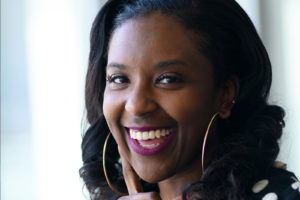Andrea Henderson G’18
In 2018, Andrea Henderson graduated from the Newhouse School with a master’s in arts journalism. Before attending Syracuse, she worked for local newspapers, websites and magazines in Houston, Texas. While at Newhouse, Henderson was a digital communications intern at Light Work Gallery and a graduate assistant for the Center for Digital Media Entrepreneurship. Post-graduation, she worked as a podcast intern and then production/news assistant at the National Public Radio (NPR) office in Washington, D.C. Currently, Henderson is a full time reporter at St. Louis Public Radio.
“Newhouse opened my eyes to other areas of journalism.”
Andrea Henderson G’18
How did you obtain your current position, and what positions did you hold before it?
A couple of months after I graduated from Syracuse, I accepted a podcast internship with National Public Radio (NPR). The internship taught me podcast production, how to report for a national audience and how to edit and produce for radio under tight deadlines. Once the internship was over, I accepted temporary positions within the company to learn more about audio editing and reporting. Since I knew I wanted to continue on as an audio reporter, I began looking for audio reporting positions across the states and, shortly after, I found out about a grant-funded reporting position. I applied for the job, and here I am today.
What’s an average day like for you on the job?

Each day is different, especially if I am working on a feature audio story. However, I try to start the day at 7 a.m. I check in on news that happened overnight, nationally and locally. While reading the news, I look for a potential story to run a radio spot on that day. I try to make it into the office between 9:30 a.m. and 10 a.m. and work until about 5 p.m., but that is not an everyday occurrence. If there is a spot that my editor wants me to work on for the day, then I will report it out in the morning, have two radio scripts ready for edit by 1 p.m., and a short web post for edit by 4 p.m. If I do not have a story to cover, then I use the day to work on scripts, edit audio, research and take meetings with potential sources. I am pretty new to the city, so I use every free moment as a networking opportunity. At my job, I am required to produce two features a month, so when I am light on work, I am in the field collecting sound, interviewing subjects and taking pictures for my next feature. Some days I work until the wee hours (at home of course) and some days I am able to leave the office around 4 p.m. The early days are rare, but they do happen.
How do you feel Newhouse prepared you for your current job?
I really believe it was, first and foremost, the connections I made within Newhouse. All of my professors left a lasting impression on me in some form. Most of them are still in the industry today, which gave me an insider’s look at the area of journalism I wanted to pursue.
A couple of skills that took my career to the next level was learning video and audio editing. Although, I do not use video at my current job, it is still a skill I keep up with for future opportunities. I came into the arts journalism program with long form writing skills, and the AJ courses helped me learn how to say more with less words.
What are some obstacles or misconceptions about your field that students ought to be aware of?
Please note that, in media, there is no one path to your career. There will be some disappointments when it comes to the job market, so don’t get discouraged if you do not land a job right out of graduate school. You have to continue to apply for jobs, take freelance gigs and temporary work until you receive the job of your dreams. Also, invest in yourself, because the media landscape is everchanging. Do not depend on any one media outlet to be around forever because most likely they will not. Start brainstorming ideas now so that you can be a media entrepreneur in the future.
What advice do you have for current or incoming students?
Over the course of your time at Newhouse, be prepared to work and never sleep. However, just know those sleepless nights will pay off in the end. Come in with a plan or at least an outline of what you want to accomplish while in graduate school and make it your goal to complete every line on your list. Be sure to audit as many classes as you can because you can learn valuable skills without having to pay for the courses. Lastly, get comfortable with networking because you will have to do this for the rest of your career.
When looking for courses, you won’t go wrong with classes offered by Corey Takahashi, Sean Branagan, Aileen Gallagher, Jon Glass, Jim Shahin and any professor in the arts journalism program.